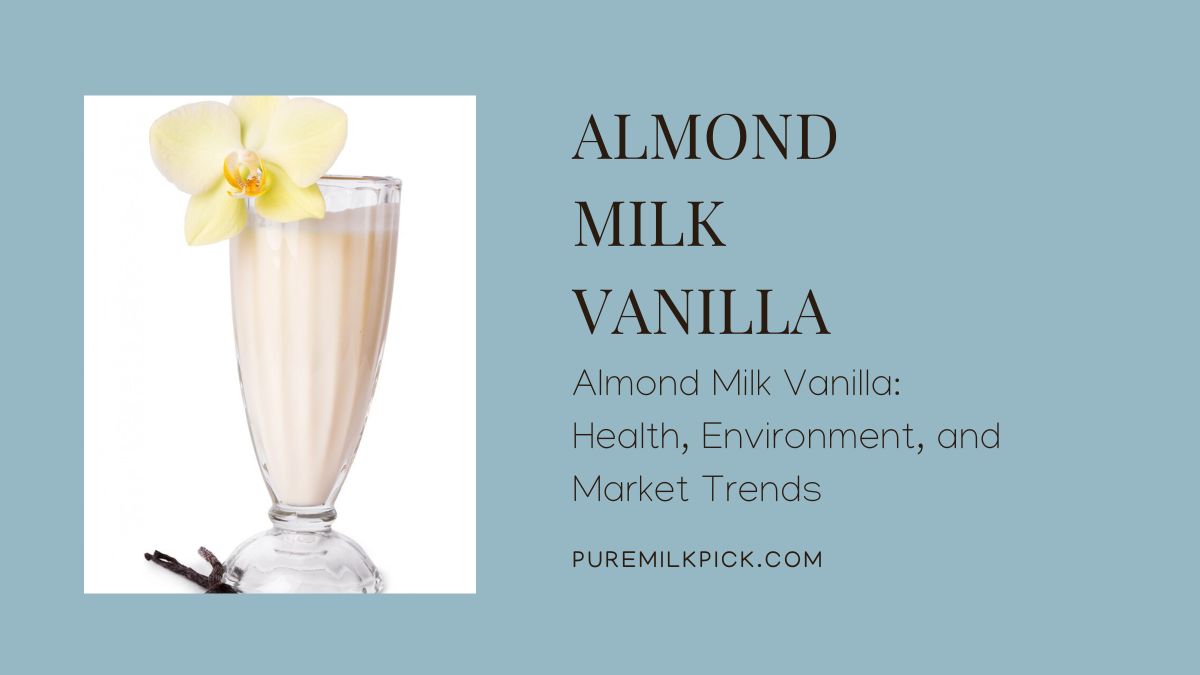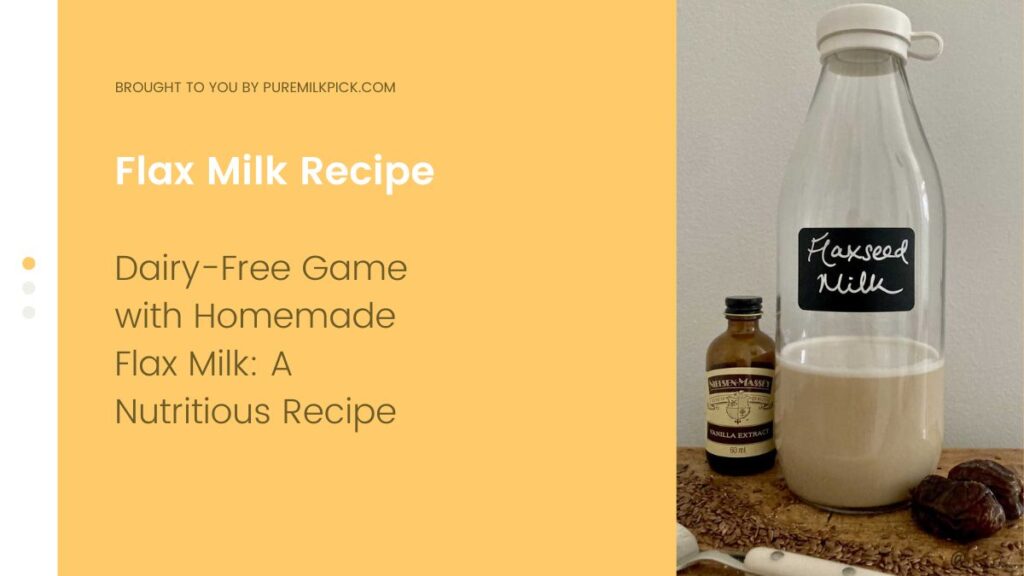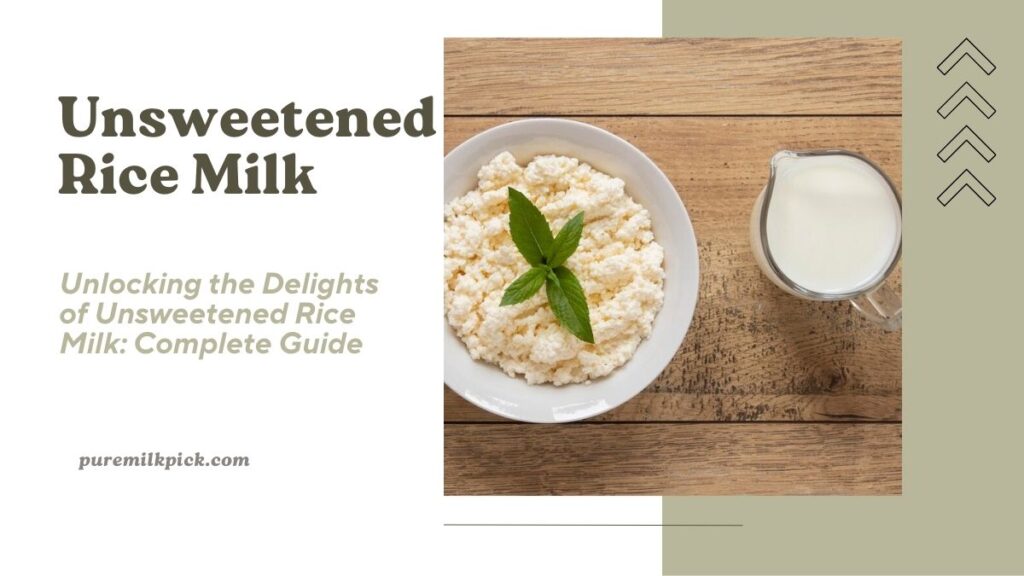Welcome to the enchanting world of almond milk vanilla – a harmonious blend of rich, nutty almond milk and the sweet, aromatic undertones of vanilla. In recent years, there has been a significant shift towards plant-based diets, driven by growing concerns about health, sustainability, and animal welfare.
A critical part of this revolution has been the rise in popularity of plant-based alternatives to dairy milk. Amongst these, almond milk vanilla holds a special place for its irresistible flavor and versatility. It’s a delightful addition to your breakfast cereal, coffee, smoothies, and even baking recipes, infusing each dish with its unique creamy elegance. Embrace the charm of almond milk vanilla and embark on a delicious journey towards healthier living.
The Essence of Almond Milk Vanilla
What is almond milk vanilla?
At its core, almond milk vanilla is a delightful concoction created from almonds and water, infused with the essence of vanilla to create a sweet and nutty beverage. The making process is fairly straightforward. Almonds are soaked in water, then blended and strained to yield a creamy, milk-like liquid. Vanilla extract is added to infuse the almond milk with its distinctive aroma and flavor.
The making process and its nutritional profile.
Nutritionally, almond milk vanilla is an excellent choice for those seeking a healthy alternative to dairy. It is naturally lactose-free, making it suitable for people with lactose intolerance. Moreover, it is low in calories and high in vitamin E, a powerful antioxidant. When compared to traditional dairy milk and other plant-based alternatives, almond milk vanilla tends to have fewer calories and less protein. However, it makes up for this with its unique flavor profile and versatility in culinary applications.
Almond milk vanilla to traditional dairy and other plant-based alternatives.
Whether you’re exploring plant-based diets or just seeking a flavorful twist to your usual beverages and dishes, almond milk vanilla offers a delightful and healthful option. With its creamy texture, nutty taste, and sweet vanilla undertones, it’s sure to make your culinary journey a deliciously memorable one.
Read More: Black Sesame Milk: The Nutrient-Packed Elixir You Need to Try
Health Benefits and Nutritional Value
Almond milk vanilla boasts a multitude of health benefits that make it an excellent dietary choice. With its low caloric profile, it serves as a great option for those seeking weight management strategies. It is also lactose-free, making it a perfect choice for individuals with lactose intolerance or those simply opting for a plant-based diet.
Nutritionally, almond milk vanilla is a powerhouse. It is packed with essential vitamins and minerals, including a high concentration of Vitamin E – a potent antioxidant that helps protect your cells from damage. Additionally, almond milk is a good source of calcium and vitamin D, making it an ideal choice for maintaining bone health.
In comparison to traditional dairy and other plant-based alternatives, almond milk vanilla stands out for its unique balance of flavor and nutritional benefits. While it may have less protein than dairy milk, its significantly lower calorie count and the absence of lactose make it a healthier and more digestible choice for many. With its creamy texture, almond milk vanilla is a versatile ingredient that can be used in various culinary applications, enhancing your dishes and beverages with its rich, nutty flavor and sweet vanilla undertones.
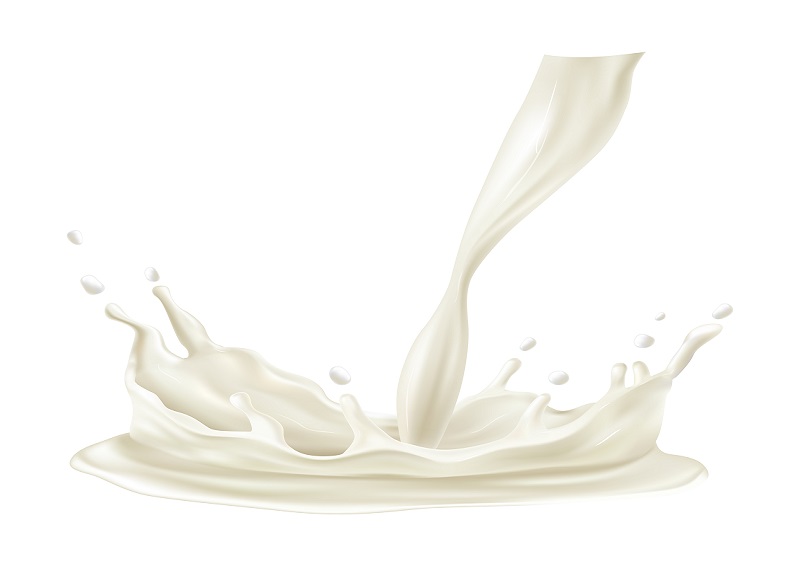
Culinary Versatility
Using Almond Milk Vanilla in Everyday Cooking: From Breakfast to Dessert
The enticing flavor of almond milk vanilla makes it an exceptional addition to a wide range of dishes – from breakfast to dessert. Start your day with a bowl of oatmeal or cereal, generously doused with almond milk vanilla for a sweet, nutty twist. In your favorite smoothie recipe, replace regular milk with almond milk vanilla to add a delectable creaminess. For a treat, pour it over fresh berries for a healthy, delicious dessert.
Exploring its Applications in Savory Dishes, Beverages, and Baked Goods
Almond milk vanilla is not just for sweet dishes; it’s also a great addition to savory recipes. Its nutty flavor can complement many savory dishes like soups and curries, adding depth and richness. Beverages, too, get an upgrade with almond milk vanilla. Whether it’s a latte, hot cocoa, or a smoothie, almond milk vanilla can enhance the taste while adding a creamy texture. And let’s not forget baked goods – replace the regular milk in your cake or cookie recipe with almond milk vanilla, to add a rich, nutty flavor and moist, tender texture.
Sharing Recipes and Creative Ways to Incorporate Almond Milk Vanilla into Different Cuisines
Cooking with almond milk vanilla opens up a world of possibilities for creative culinary exploration. Try making a Thai-inspired almond milk vanilla curry, or use it as a base for an Indian-style kheer dessert. How about a French vanilla almond milk latte to start your day or a Mediterranean almond milk vanilla risotto for dinner? These recipes not only showcase the versatility of almond milk vanilla but also allow you to experiment and incorporate it into various cuisines, enhancing the flavor profile of every dish.
Environmental and Ethical Considerations
When it comes to the sustainability aspect, the ecological footprint of almond milk production is a subject of ongoing debate. Like all agricultural practices, almond farming has its environmental impacts, notably water consumption which is significantly higher compared to other plant-based milks. However, recent agricultural developments aim to improve water management practices, highlighting the industry’s commitment to sustainability.
Comparing the environmental impact of almond milk to dairy milk.
Comparing the environmental impact of almond milk to dairy milk presents a complex picture. Dairy milk production involves significantly higher greenhouse gas emissions and is responsible for a larger share of land use. Almond milk, on the other hand, demands more water. However, it is critical to note that the total ecological footprint of a product is not solely determined by its primary ingredient and must consider all stages of production.
Discussing ethical implications and the role of almond milk in ethical consumerism.
Finally, the role of almond milk in ethical consumerism cannot be overlooked. As a plant-based alternative, almond milk does not involve the ethical issues associated with animal farming. Choosing almond milk contributes to a shift towards more sustainable and ethical food choices, aligning with the values of many conscious consumers today.
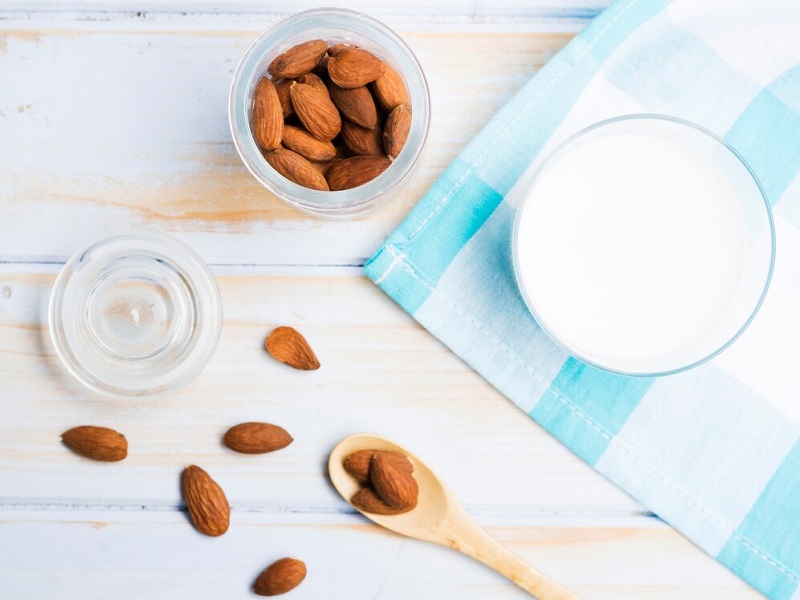
Consumer Tips and Market Trends
Tips for selecting and storing almond milk vanilla.
When selecting almond milk vanilla, it’s essential to read the label carefully. Choose brands that use minimal preservatives and added sugars to ensure you’re enjoying the healthful benefits of almond milk. Once opened, almond milk vanilla should be stored in the refrigerator and consumed within 7-10 days. Unopened, it can be stored at room temperature until the best-by date.
Discussing the market growth and trends in the almond milk industry.
The almond milk industry has seen significant growth in recent years, driven by increasing consumer awareness of plant-based alternatives and health trends. According to reports, the global almond milk market size was valued at USD 5.2 billion in 2019 and is projected to grow at a compound annual growth rate (CAGR) of 14.3% from 2020 to 2027.
Notable brands and product variations are available to consumers.
Numerous brands are catering to the rising demand for almond milk. Notable ones include Alpro, Silk, and So Delicious. Each brand offers a range of product variations, with some providing unsweetened, sweetened, and flavored options like vanilla and chocolate.
Conclusion
In summary, almond milk vanilla presents a fantastic alternative to traditional dairy, offering a wealth of culinary options – from savory dishes to sweet treats. Its nutty and creamy undertones enhance the flavor of beverages, baked goods, and even sophisticated cuisines from around the world. As consumers, we must be mindful of the environmental and ethical implications of our choices. Almond milk production, while requiring more water than other plant milk, emits less greenhouse gas and uses less land than dairy milk. Furthermore, as a plant-based product, it aligns with ethical consumerism, avoiding the issues associated with animal farming.
When choosing almond milk vanilla, it’s important to select brands with minimal preservatives and added sugars, and to store it properly to maintain its quality. Its rising popularity and increasing market growth, fueled by the shift towards plant-based alternatives and health trends, have led to a variety of product options from brands like Alpro, Silk, and So Delicious.
In conclusion, almond milk vanilla is a flavorful, versatile, and healthy choice worth exploring. Whether you’re a seasoned vegan or just striving to diversify your diet, incorporating almond milk vanilla into your meals can add a refreshing twist, contributing to a delightful culinary experience while aligning with conscious and ethical food choices. Embrace the change, and you might even discover your new favorite ingredient!
Frequently Asked Questions
Almond milk vanilla is a low-calorie, dairy-free alternative that is rich in vitamin E and calcium. It’s also a good choice for those who are lactose intolerant or looking to reduce calorie intake. However, it’s important to choose versions with minimal added sugars and preservatives to fully enjoy its health benefits.
While almond milk does require more water to produce than other plant-based milk, it emits less greenhouse gas and uses less land than dairy milk. It’s a complex issue, and consumers should consider all aspects of production when making their choices.
There are numerous ways to use almond milk vanilla in your diet. You can use it as a milk substitute in your coffee or tea, add it to your smoothies, or use it in baking. You can also experiment with savory recipes like curries and risotto. The possibilities are endless.
